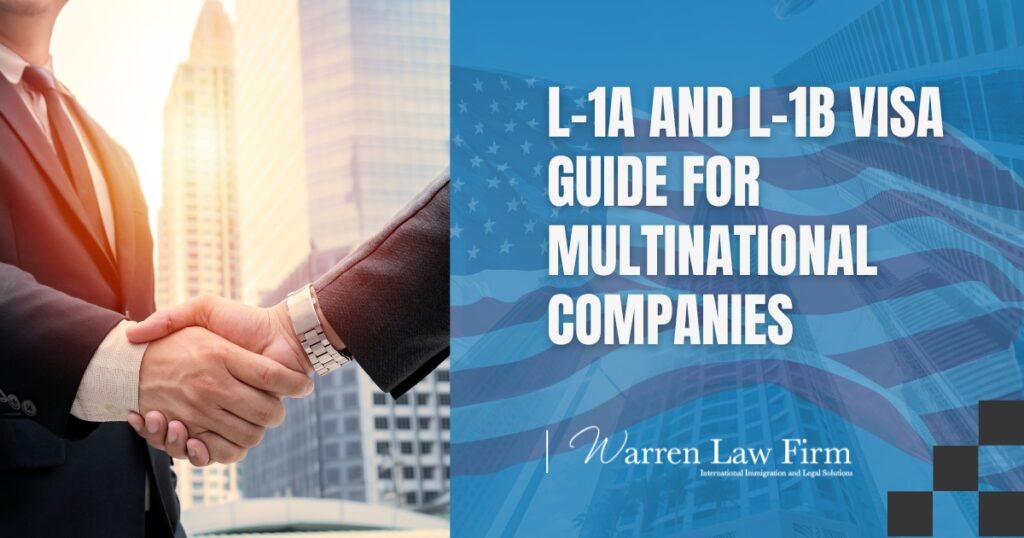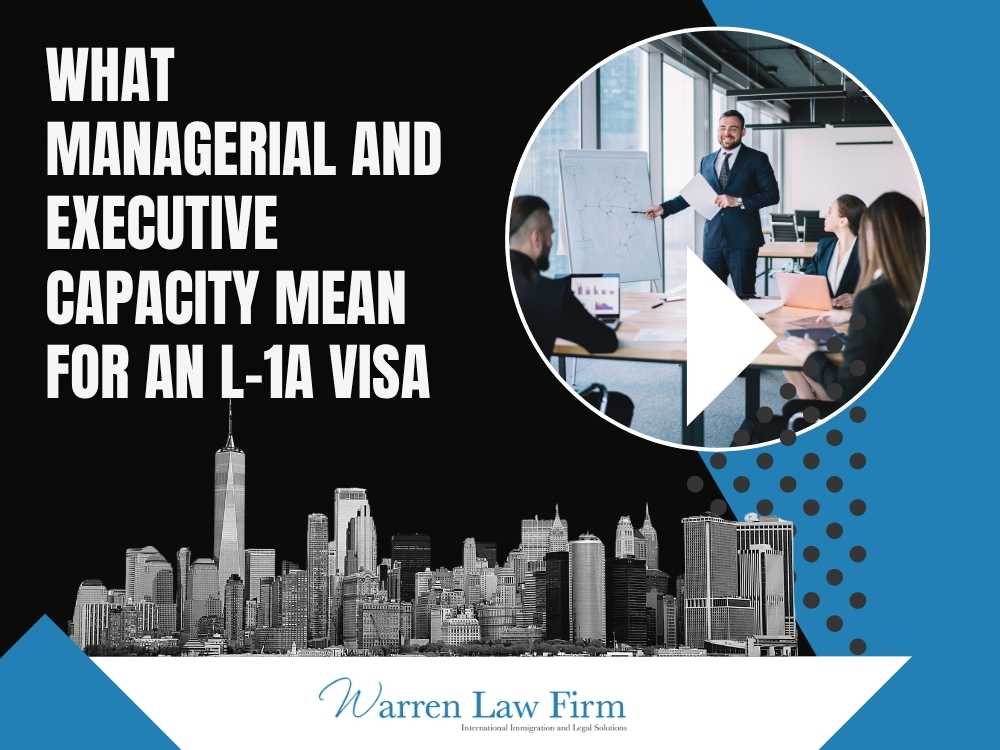L-1 Visa Lawyer
Home » Work Visas and Employment Green Cards » L-1 Visa Lawyer

Our dedicated attorneys at Warren Law Firm focus on global immigration law and helps both U.S. employers and foreign national professionals obtain a variety of visas so they can work in the United States.
L-1A and L-1B visas are work permits designed to facilitate international transfers of personnel between related businesses. The former is intended for executives or managers, while the latter allows qualified employees with specialized knowledge to join a foreign branch office located in the U.S. With these types of nonimmigrant visas, companies can easily transfer key individuals from their home country into working roles in America.
Unlike many immigration categories, the L-1 visa offers flexibility for both employers and employees. It allows businesses to expand into the U.S. while enabling foreign professionals to bring their expertise to American operations. This visa type is particularly valuable for global companies establishing a U.S. presence or strengthening cross-border management structures.
With 20 years of experience obtaining work visas and employment green-cards,, our experienced L-1 visa lawyers specialize in helping multinational companies and employees navigate the complex process of L-1A and L-1B visa applications. Whether you’re comparing L1A vs L1B requirements or planning to transfer executive-level staff to your U.S. branch, our firm provides tailored strategies that align with your business goals.
Our track record of success includes obtaining L-1A and L-1B visas across various industries, including:
- Food and Wine
- Communications
- Jewelry Manufacturing
We’ve outlined everything you need to know about these two visa classifications, including:
- Benefits
- Differences between the two
- How to qualify for each visa
- Requirements for establishing new offices
- How long each visa lasts
- How to obtain each visa
Table of Contents
Request A Consultation
Meet The Attorney
Angela D. Warren
With more than 20 years of immigration and business immigration experience, Angela Warren has helped hundreds of individuals, families and businesses.
Get The Immigration Help You Deserve
L-1A vs L-1B Visas: What’s the Difference?
The L-1A nonimmigrant visa allows a U.S.-based employer to transfer a manager or executive from one of the company’s offices abroad to an office located in the United States. The L-1B visa is similar, except the U.S.-based employer can transfer an employee who has specialized knowledge that pertains to the company’s interests from an affiliated foreign office to an office in the U.S.
The L-1A and L-1B visas also permit a foreign company that doesn’t have a U.S.-based, functioning office presence to send the qualified employee to the U.S. to establish one. To facilitate this process, the employer needs to file Form I-129, Petition for a Nonimmigrant Worker, with USCIS on the employee’s behalf.

The main difference in the L1A vs L1B comparison lies in the employee’s role. The L-1A visa is for executives and managers who oversee significant company operations or departments, while the L-1B visa focuses on employees with specialized knowledge critical to the company’s products or services.
What are the Qualifications for an L-1A and L-1B Visa?
To qualify for an L-1A or L-1B visa, an employer needs to:
- Have a qualifying relationship with a foreign organization, which includes a branch, affiliate, subsidiary, or parent company
- Be, or plan to be, performing routine business as an employer in the U.S. that provides goods and services, and not simply having the presence of an office or agent. The employer should be doing business in one other country (at least) via a qualifying organization during the employee’s tenure in the U.S.
For an employee to qualify, they must:
- Have been employed by a foreign branch, affiliate, subsidiary, or parent company for one continuous year in the previous three years immediately before their admission to the U.S.
- Intend to enter the U.S. to perform their job in a managerial or executive capacity (L-1A visa) or to perform services in a specialized knowledge (L-1B visa) for a branch, affiliate, subsidiary, or parent company of the employer.
For clients comparing L1A vs L1B options, we conduct a detailed case evaluation to determine which visa classification best fits their organizational needs. We also help companies prepare for site visits, audits, and any required documentation updates to ensure a smooth process from start to finish.
Get The Immigration Help You Deserve
What is a Managerial Capacity and an Executive Capacity for an L-1A Visa Employee?
A managerial capacity points to an employee’s ability to control and supervise the work of employees and manage the organization, subdivision, or department of the organization. It also indicates the employee’s capability to manage key functions of the company with a high level of competency and without direct supervision.
An executive capacity means an employee’s capability to make decisions when it comes to choices that have a wide-ranging effect, without needing much oversight.

What is Specialized Knowledge for an L-1B Visa Employee?
Specialized knowledge denotes the expertise an individual possesses regarding the petitioning company’s product, equipment, services, techniques, research, management, or other interests, and how it applies to international markets. It also means having an advanced level of knowledge of the organization’s processes and procedures.
What are the L-1A and L-1B Visa Requirements for Establishing a New Office?
Foreign employers who want to send a qualifying L-1A or L-1B employee to a new office must show that they have secured ample physical premises to locate the new office.
For the L-1A visa, they must also show that the employee has been employed as a manager or executive for one continuous year within the three years before filing the Form I-129 petition, and that the planned U.S. office will be able to support a managerial or executive position within one year of their petition being approved. For the L-1B visa, they must prove that they have the finances to pay the employee and start doing business in the U.S.
Get The Immigration Help You Deserve
How Long Do L-1A and L-1B Visas Last?
Qualified employees who enter the U.S. to set up a new office are permitted an initial stay of one year. Other qualified employees are permitted an initial stay of three years. For L-1A employees, a request for an extension of their stay may be approved in increments of as many as two additional years, until they have reached a maximum of seven years.
When it comes to L-1B employees, the conditions are the same as the L-1A visa, except that a request for an extension of their stay may be approved in increments of as many as two additional years, until they have reached a maximum of five years.
In addition to obtaining visas, Warren Law Firm provides ongoing legal counsel to help clients maintain compliance, renew L-1 status, and explore green card pathways under the EB-1C category. Our detailed guidance helps employers avoid common pitfalls that can delay approvals or lead to denials.
Can you go from an L1 Visa to a Green Card?
L1 visas are dual-purpose temporary nonimmigrant visas, meaning it is fairly easy to adjust your status from an L1 visa to a lawful permanent resident.
If you are on an L-1A visa and hold a managerial or executive role in the company, you could qualify for the EB-1-C immigrant visa category that would allow you to adjust your status to a green card holder without going through the complicated PERM Labor Certification process.
If you are an L-1B visa holder, the company will just have to obtain a PERM Labor Certificate and follow the same process as other immigrants going through the employment-based green card process.
In some cases, if you have held a previous managerial/executive position for at least a year in the 3 years before you entered the U.S. on an L-1B visa and your company has promoted you to a management/executive position, you may be eligible for the EB-1-C category. If you are eligible for the EB-1-C category, you may skip the PERM Labor Certification process and go straight to a green card.
Every case is different; it is best to speak to a qualified L1 visa attorney to determine your green card eligibility.
Schedule a Consultation with an L-1 Visa Lawyer
Whether you’re a company looking to start an office in San Francisco or move a specialized or managerial employee to your existing San Francisco office, a San Francisco L-1 visa lawyer like Angela Warren can be a great resource.
Our L-1 visa lawyers also assist companies in preparing comprehensive documentation that supports the employer-employee relationship and demonstrates compliance with USCIS requirements. We ensure accuracy in Form I-129 petitions, proof of qualifying relationships, and business operation evidence for both established and new offices.
Obtaining an L-1A and L-1B work visa can be a complicated process, and having an experienced immigration attorney can help improve your chances of approval. Depending on the circumstances and the candidate, the L-1A and L-1B visa processing time can take weeks or months, from start to finish.
At Warren Law Firm, we are committed to providing individualized attention, timely communication, and effective legal representation for all L-1A, L-1B, and other employment-based visa applicants.
To start the process of obtaining an L-1A visa, L-1B visa, or other work visa, contact Warren Law Firm to schedule a consultation. By obtaining documentation ahead of time, you will make the most of our consultation together.
